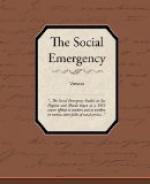I do not desire to convey the idea that our boy was a wicked boy. He was not. He was just the average type of what we call the “upper middle-class” boy. He was merely tuned to the low moral tone of the city. Vice to him was not a monster of hideous mien. He had seen it from childhood.... I knew that a greater part of his ideas on patriotism, on women, on the sanctity of marriage were but reflections of views he had heard expressed, often tritely and cleverly, and cynicism born of hearing such things flaunted over the footlights or dished out as “clever” in the newspapers.
In the father’s earnest efforts to understand the remedy for the situation, he is reminded of his own experience when he began life in the city. He continues:—
The boy’s words awakened memories. I recalled the sense of shocked and shamed decency I felt when first I came to the city, a boy almost, and fresh from the country; how I tossed in my bed trying to see as right things that every one in the city appeared to accept as a matter of course, but that, from earliest boyhood I had been taught to regard as wicked. I could not for many months become accustomed to seeing immodestly dressed women on or off the stage, or to hearing half-veiled indecency flaunted from the stage, blazoned in the newspapers, or used even in ordinary conversation. I could not get used to ... scenes and actions directly forbidden as unforgivable at home.[46]
We are horrified by certain vices, the public now and then cries out against specific manifestations of lust, and sometimes it is with difficulty that mobs are restrained from violence But about much of our immorality there is an attractiveness that has made it acceptable and even wins for it applause. The influence is there, and it is insidiously and perniciously working itself into the minds of our boys Many commercialized amusements now exploit the sex impulse. It is impossible to measure the effects of such exploitation.
There are brighter pictures. Those who have intimate relation with hundreds of boys learn to admire the American boy for his earnest desire to be clean and strong and for his attitude toward the sacred things of life. If we give the boy positive help, we may expect him to grow into noble manhood. We would not remove him from all the evil in the world, but we may expect a minimum of harm as a result of contact with evil. We may not expect to keep him away from all foul talk; but we may make foul talk disgust rather than attract him. The American boy is normally clean. If we will do our part, he will respond.
William Holabird represents a type which may well be taken as an example in sex education.




